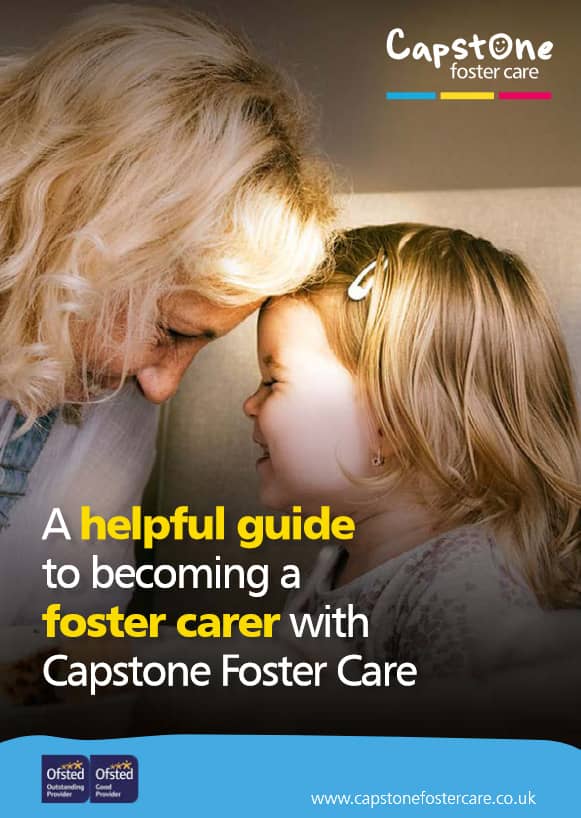


Fostering a disabled child
The role of an independent fostering agency
How to choose a foster care agency
Can I choose who I foster?
What are the benefits of fostering with an independent fostering agency?
What happens when a child is taken into care?
Fostering process: what happens on an initial home visit?
Fostering with local authority vs independent agency
A complete guide to becoming a foster carer
How Are Children in Foster Care Matched with Carers?
Foster Care Budgeting Tips
Becoming A Foster Carer
What is a Care Leaver?
What is a Foster Carer?
Fostering Regulations
How long does it take to become a Foster Carer?
What are the Foster Care requirements?
Changing IFA - Transferring to Capstone
8 reasons why a child may be taken into care
Fostering as a Career
Can you foster if you smoke or vape?
A guide to fostering assessments
LGBTQ+ Fostering
Equality, Inclusion & Anti-discriminatory Practice in Foster Care
What can disqualify you from foster care?
Can you foster if you’re on benefits?
Top transferable job skills to become a foster carer
Fostering as a same sex couple
Fostering while renting
Can you foster if you have mental health issues?
Is there an age limit for fostering in the UK?
Do foster carers get a pension?
How to foster a child: A step by step guide
How do DBS Checks Work?
Can I foster if...?
Mythbusting the top 10 Foster Care Myths
Can I foster if I am disabled?
LGBT Fostering Mythbusting
Can I foster if I have pets?
Can I Foster A Child?
Can I Foster and Work?
Can you Foster with a Criminal Record
Can Single People Foster?
LGBT Family and Foster Care
Fostering across Cultures
Muslim Fostering
Christian Foster Care
Sikh Fostering
Empty Nest Syndrome and Foster Care
Can I Foster?
What is the difference between residential care and foster care?
Fostering Babies and Young Children
What is Kinship Care?
Fostering Babies - Myths
Focusing on Parent & Child Fostering
Fostering Siblings
Fostering Teenagers
Fostering Teenagers - Breaking down the Myths
Fostering Unaccompanied and Asylum Seeking Children
Mother and Baby Foster Placements
Private Fostering
How does therapeutic fostering work?
Young Children Fostering Placements
Difference between short and long-term fostering
Types of self-harm
A Guide to the Foster Care Handbook
Reunification and Birth Parents: A Guide for Foster Carers
What is an EHC Plan? A Guide for Foster Carers
How to prepare a child for becoming a care leaver
Children who foster: impact of fostering on birth children
Fostering LGBTQ+ Youth
How to prepare your home for a foster child
How to help a lonely child: A Guide for Foster Carers
What are the National Minimum Standards for Fostering Services?
10 tips for foster children's education
How to prepare your foster child for secondary school
Tips for coping when foster placements end
Tips for foster parents during Coronavirus
What happens if foster parents get divorced?
5 ways to manage Mother's Day with foster children
Tips for managing foster children's bedtime routines
How to handle foster child bullying
Fostering allowances and the gender pay gap
What discounts can foster carers get?
How to adopt from Foster Care
5 ways to manage Father's Day for children in foster care
8 most common fostering challenges
FosterTalk Membership with Capstone Foster Care
Supporting foster children's contact with birth families
A guide to independent fostering
Keeping Children Safe Online: A Guide For Foster Carers
Movies About Foster Care
Play-based learning strategies for foster carers
A Guide to the Staying Put Program
Why Foster Parent Wellbeing Matters
How to deal with empty nest syndrome
How to recognise signs of depression in foster children
Can you take a foster child on holiday?
Tips and advice on fostering with a disability
10 tips on connecting with your Foster Child
Fostering vs Adoption - What's the difference?
How Fostering can change a future
How to adopt from Foster Care
How to encourage children to read in Foster Care
How to prepare a Foster Child's bedroom
Reading and Storytelling with Babies and Young Children
Supporting Children's Learning
The 20 most recommended books Foster Carers and young people should read
Things you can do when your children leave home
The impact of early childhood traumas on adolescence and adulthood
Anxious Disorders in Foster Children
What is sexual abuse and sexual violence
Foster Child behaviour management strategies
Foster Parent Advice: What to expect in your first year of fostering
Capstone's twelve tips at Christmas
10 celebrities who grew up in Foster Care
Could Millenials be the solution to the Foster Care crisis?
Do you work in Emergency Services?
Form F Assessor and Assessment Training
Foster Care Fortnight
Improving Children's Welfare - Celebrating Universal Children's Day
New Year - New Career - Become a Foster Carer
Young People Charities
As a foster carer, you may face many challenges on your fostering journey that are difficult to navigate. Self-harming is an issue that can affect children in many ways, for a number of reasons. As a foster carer, it can be upsetting to learn that your foster child may be struggling with this, and you may not know where to start to try and tackle it.
In this guide, we outline this difficult topic to help give you a better understanding of what it is, how it happens and how you can help and support your foster children.
Self-harming is a way in which a child copes with negative feelings and difficult experiences. It’s not usually an attempt at suicide or a cry for help, although people who self-harm often find it provides temporary relief for their overwhelming negative feelings and thoughts. This brief relief of pressure is seen as a way of controlling negative feelings on a day-to-day basis, but is then replaced with further feelings of guilt or pressure – which is how the cycle continues.
There are different behaviours that can be seen as self-harm. These are typically broken down into two categories, physical and emotional self-harm.
Types of physical self-harm can include:
Types of emotional self-harm can include:
Self-harming typically has an underlying reason. For many foster children, negative experiences from their past or mental health conditions could impact why a young person may want to hurt themselves physically. Over time, self-harm can develop into a habit. Even if a child appears happy or seems to have overcome their issues, they may still be self-harming as a way of controlling their emotions to ensure their negative feelings do not return. Reasons why a child may self-harm can include:
Though some signs of self-harming may be visible in the form of scars and marks, it can be difficult to know when your foster child is hurting themselves. As self-harming isn’t usually done for attention, children who self-harm are more likely to cover-up any evidence. This makes spotting the signs difficult to point out. Below are some signs to be aware of if you suspect your child may be self-harming:
If you think your foster child is self-harming, it can be very difficult to know what to do. You may feel upset, confused or even angry, and wonder how you missed the signs. Similarly, if you only suspect that they’re harming themselves, you may not know how to approach them and offer the kind of help and support they need.
Below, we’ve listed some things that can help your child cope with self-harm, as well as the resources we’d recommend for additional help and advice.
If you suspect your child may be self-harming, you may find it difficult to approach the situation and offer the help and support they need. Whilst your social worker will be on-hand to offer you any support and guidance you may need, there are other ways you can help your foster child such as:
At Foster Care UK, our social workers provide additional support to our foster carers as well as self-harm training. In some cases, children can be referred for our Multi-disciplinary Assessment Treatment & Therapy service (MATTs) if they haven’t already been referred when they arrived in foster care.
Here at Foster Care UK, we understand issues like self-harm can be difficult to navigate. That’s why we provide extensive support and guidance for foster carers at all times. To find out more, get in touch with us today.
If you’ve got any questions or would like to find out more about fostering with Capstone, fill out the form below.
An experienced fostering advisor from your local area will then be in touch.

Start the conversation today. Our team of friendly advisors are on hand to answer any foster care questions you may have. We can offer you honest and practical advice that can help you decide if becoming a foster carer is the right path for you.


